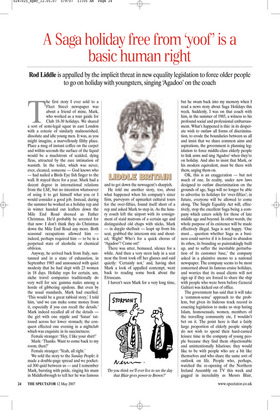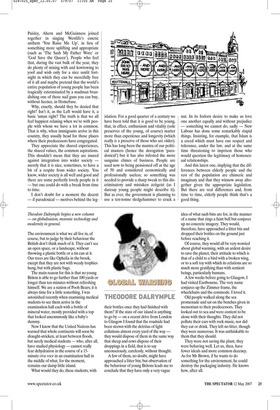A Saga holiday free from ‘yoof’ is a basic human right
Rod Liddle is appalled by the implicit threat in new equality legislation to force older people to go on holiday with youngsters, singing ‘Agadoo’ on the coach The first story I ever sold to a Fleet Street newspaper was about a friend of mine, Mark, who worked as a tour guide for Club 18-30 holidays. We shared a sort of semi-legal squat in east London with a coterie of similarly malnourished, dissolute and idle young men. It was, as you might imagine, a marvellously filthy place. Place a mug of instant coffee on the carpet and within seconds the surface of the liquid would be a maelstrom of scalded, dying fleas, attracted by the rare intimation of warmth. In the toilet, which was never, ever, cleaned, someone — God knows who — had nailed a Birds Eye fish finger to the wall. It stayed there for a year. Mark had a decent degree in international relations from the LSE, but no intention whatsoever of using it to get himself what you or I would consider a good job. Instead, during the summer he worked as a holiday rep and in winter handed out leaflets down the Mile End Road dressed as Father Christmas. He’d probably be arrested for that now: I don’t think they do Christmas down the Mile End Road any more. Both seasonal occupations allowed him indeed, perhaps required him — to be in a perpetual state of alcoholic or chemical oblivion.
Anyway, he arrived back from Italy, suntanned and in a state of exhaustion, in September 1985 and announced with quiet modesty that he had slept with 23 women in 18 days. Holiday reps for certain, um, niche travel companies traditionally do very well for sex: gamma males among a horde of gibbering epsilons. But even by the usual standards, Mark had excelled. ‘This would be a great tabloid story,’ I told him, ‘and we can make some money from it, especially if you can recall the details.’ Mark indeed recalled all of the details the girl with one nipple and ‘Satan’ tattooed across her lower stomach; the conquest effected one evening in a nightclub which was exquisite in its succinctness: Female stranger: ‘Hey, I like your shirt!’ Mark: ‘Thanks. Want to come back to my room, then?’ Female stranger: ‘Yeah, all right.’ We sold the story to the Sunday People; it made a double-page spread and we pocketed 300 quid between us — and I remember Mark, bursting with pride, ringing his mum in Middlesbrough to tell her he was famous and to get down the newsagent’s sharpish.
He told me another story, too, about what happened when his company’s sister firm, purveyors of upmarket cultural tours for the over-fifties, found itself short of a rep and asked Mark to step in. As the luxury coach left the airport with its consignment of staid matrons of a certain age and distinguished old chaps with sticks, Mark — in dayglo shellsuit — leapt up from his seat, grabbed the intercom mic and shouted, ‘Right! Who’s for a quick chorus of “Agadoo”! Come on!’ There was utter, bemused, silence for a while. And then a very stern lady in a seat near the front took off her glasses and said quietly: ‘Certainly not,’ and, having shot Mark a look of appalled contempt, went back to reading some book about the Etruscans.
I haven’t seen Mark for a very long time, but he swam back into my memory when I read a news story about Saga Holidays this week. Suddenly, I was on that coach with him, in the summer of 1985, a witness to his profound social and professional embarrassment. What’s happened is this: in its desperate wish to outlaw all forms of discrimination, to erode the boundaries between us all and insist that we share common aims and aspirations, the government is planning legislation to force middle-class elderly people to link arms and sing ‘Agadoo’ when they’re on holiday. And also to insist that Mark, or his modern equivalent, must be there with them, urging them on.
OK, this is an exaggeration — but not much of one. In reality, under new laws designed to outlaw discrimination on the grounds of age, Saga will no longer be able to advertise its holidays for ‘over-fifties’; in future, everyone will be allowed to come along. The Single Equality Act will, effectively, stop the excellent Saga being a company which caters solely for those of late middle age and beyond. In other words, the whole purpose of its existence will be made effectively illegal. Saga is not happy. ‘One must... question whether Saga as a business could survive if it is forced to abandon its ethos, its branding so painstakingly built up, and to suffer the inevitable perturbation of its customer base,’ the company asked in a plaintive memo to a national newspaper. The company seems to be most concerned about its famous cruise holidays, and worries that its usual clients will not sign up if they are forced to share the ship with people who were born before General Galtieri was kicked out of office.
The government has said that it will take a ‘common-sense’ approach to the problem, but given its hideous track record in enacting legislation to make us stop hating Islam, homosexuals, women, members of the travelling community etc, I wouldn’t bet on it. The point here is that a fairly large proportion of elderly people simply do not wish to spend their hard-earned leisure time in the company of young people because they find them objectionable and unintentionally hilarious; they would like to be with people who are a bit like themselves and who share the same sort of outlook on life. People who, perhaps, watched the re-opening of the Northern Ireland Assembly on TV this week and gagged in incredulity as Messrs Blair, Paisley, Ahern and McGuinness joined together in singing Westlife’s emetic anthem ‘You Raise Me Up’, in lieu of something more uplifting and appropriate (such as ‘The Sash My Father Wore’ or ‘God Save the Queen’). People who feel that, during the vast bulk of the year, they do plenty of mixing with and kowtowing to yoof and wish only for a nice sunlit fortnight in which they can be mercifully free of it all and maybe pretend that the world’s entire population of young people has been tragically exterminated by a madman brandishing one of those nail guns you can buy, without licence, in Homebase.
Why, exactly, should they be denied that right? Isn’t it, as the Left would have it, a basic ’uman right? The truth is that we all feel happiest relaxing when we’re with people with whom we have a lot in common. That is why, when immigrants arrive in this country, they usually head for those places where their predecessors have congregated.
They appreciate the shared experiences, the shared values, the common aspirations. This shouldn’t mean that they are inured against integration into wider society merely that it is nice, sometimes, to have a bit of a respite from wider society. You know, wider society is all well and good and there are some perfectly lovely people in it — but one could do with a break from time to time.
I don’t doubt for a moment the decent — if paradoxical — motives behind the leg islation. For a good quarter of a century we have been told that it is good to be young, that, in effect, enthusiasm and vitality (sole preserves of the young, of course) matter more than experience and longevity (which really is a preserve of those who are older). This has long been the mantra of our political masters (hence the derogation ‘paradoxical’) but it has also infested the more sanguine climes of business. People are used now to being pensioned off at the age of 50 and considered economically and professionally useless; so something was needed to provide a sharp tweak to this discriminatory and mistaken zeitgeist (as I daresay young people might describe it). But as ever, the government is planning to use a ten-tonne sledgehammer to crack a nut. In its forlorn desire to make us love one another equally and without prejudice — something we cannot do, sadly — New Labour has done some remarkably stupid things. Insisting, for example, that Islam is a creed which must have our respect and tolerance, under the law, and at the same time threatening to imprison those who would question the legitimacy of homosexual relationships.
And this latest one, implying that the differences between elderly people and the rest of the population are chimeric and imaginary and that they winnow away altogether given the appropriate legislation. But there are real differences and, from time to time, elderly people think that’s a good thing.











































































 Previous page
Previous page